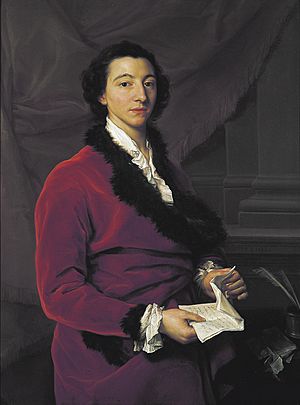Ralph Howard, 1st Viscount Wicklow facts for kids
Quick facts for kids
The Viscount Wicklow
PC (I)
|
|
|---|---|

Portrait of Viscount Wicklow by Pompeo Batoni, 1752
|
|
| Member of Parliament for County Wicklow | |
| In office 1761–1776 Serving with Hon. Richard Wingfield, William Brabazon
|
|
| Preceded by | Anthony Brabazon Richard Chapel Whaley |
| Succeeded by | William Brabazon Hon. John Stratford |
| Member of Parliament for St Johnstown | |
| In office 1768–1769 Serving with William Talbot
|
|
| Preceded by | William Forward William Talbot |
| Succeeded by | William Talbot Hugh Howard |
| In office 1761–1761 Serving with William Forward
|
|
| Preceded by | William Forward Hon. George Hamilton |
| Succeeded by | William Forward William Talbot |
| Personal details | |
| Born |
Ralph Howard
29 August 1727 Shelton Abbey, County Wicklow |
| Died | 26 June 1789 (aged 61) Dublin, Ireland |
| Spouse | |
| Children | 11 |
| Parents | Robert Howard Patience Boleyn |
| Residence | Clonmore Castle |
Ralph Howard (born August 29, 1727 – died June 26, 1789) was an important Irish politician and a nobleman. He was known as the 1st Viscount Wicklow. He was also a member of the Privy Council of Ireland, which was a group of trusted advisors to the ruler.
Contents
Early Life of Ralph Howard
Ralph Howard was born on August 29, 1727. His birthplace was Shelton Abbey in County Wicklow, Ireland. He was the oldest of seven children.
His father was Robert Howard, who was a Bishop of Elphin. His mother was Patience Boleyn. Ralph's family had some interesting connections. His grandmother, Patience Boleyn, was distantly related to Anne Boleyn, a famous queen in English history.
Ralph Howard's Political Career
Ralph Howard started his public service as a High Sheriff. This role was like a chief law enforcement officer for a county. He was High Sheriff of Wicklow in 1749. Later, in 1754, he was High Sheriff of County Carlow.
Becoming a Member of Parliament
In 1761, Ralph Howard was elected as a Member of Parliament (MP). An MP is a person chosen to represent a group of people in the government. He was elected for two areas: County Wicklow and St Johnstown. He chose to represent County Wicklow. He was re-elected for County Wicklow in 1768.
Joining the Privy Council
In May 1770, Ralph Howard became part of the Privy Council of Ireland. This was a special group of advisors to the King or Queen. Being a member meant he was very trusted and important in the government.
Becoming a Nobleman
Ralph Howard received special honors from the King. On July 12, 1776, he was given the title Baron Clonmore. This made him a member of the Peerage of Ireland, which is a group of nobles. His title was linked to Clonmore Castle in County Carlow.
Later, in June 1785, he received an even higher honor. He was given the title Viscount Wicklow. This meant he was a very important nobleman. He passed away about a year after receiving this title.
Ralph Howard's Family Life
On August 11, 1755, Ralph Howard married Alice Forward. She was the only daughter and heir of William Forward. Together, Ralph and Alice had eleven children.
Their Children
- Robert Howard (1757–1815): He became the 2nd Earl of Wicklow after his mother. He was a Representative Peer for Ireland, meaning he represented Ireland's nobles in the government from 1800 to 1815. He never married.
- William Howard (1761–1818): He became the 3rd Earl of Wicklow. He married Eleanor Caulfeild.
- Hugh Howard (1761–1840): He also became a Member of Parliament. He married Catharine Bligh in 1792.
- Henry Howard (died 1793): He sadly died in a battle in Flanders.
- Mary Howard (died 1798): She married Rev. Thomas Hore in 1797.
Ralph Howard passed away on June 26, 1789, in Dublin. His wife, Alice, was later given her own title. She became the Countess of Wicklow in 1793. She died in 1807, and their son, Robert, became the Earl of Wicklow.
Howard Mausoleum
Ralph Howard's burial place, known as the Howard Mausoleum, is famous for its unique design. It looks like a large pyramid.
 | Delilah Pierce |
 | Gordon Parks |
 | Augusta Savage |
 | Charles Ethan Porter |

